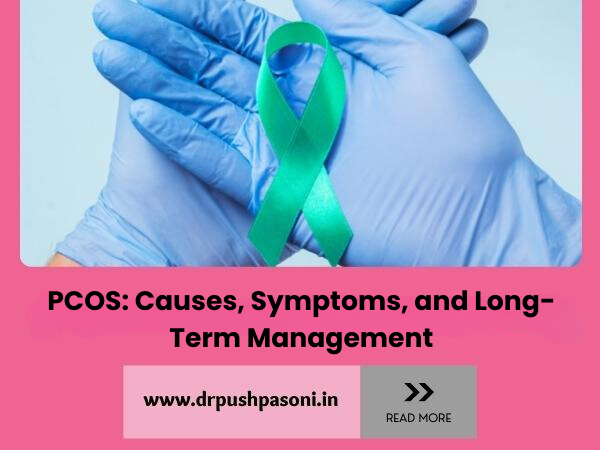PCOS: Causes, Symptoms, and Long-Term Management
- Home
- Blog
- PCOS: Causes, Symptoms, and Long-Term Management

PCOS is a hormonal disorder that is common in women of reproductive age (15-45 years). It is a chronic disease with a longitudinal treatment perspective. The incidence is 5 to 15% in the reproductive age group. In about 30% of women, the problem of infertility is due to PCOS.
Causes:
The exact cause of PCOS is unknown. There are many reasons associated with PCOS
- Insulin Resistance
- Androgen Excess
- Obesity
- Genetics
Symptoms:
Adolescent Presentations:
- Hirsutism
- Acne
- Hair Loss Issue
- Menstrual Delay
- Continuous Heavy Bleeding
Fertile life:
- Anovulation
- Oligo-ovulation
- Sub Fertility
Midlife:
- DM (type 2)
- HTN
- Obesity
- Hyperlipidemia
- CVD
- Endometrial Hyperplasia
- Endometrial Cancer.
Lifestyle changes:
- We treat infertility according to the stage of life of the woman.
- I would recommend losing weight through a low-calorie diet.
- Combined with moderate exercise
- The condition improves with a reduction of 5-7% of body weight.
- Losing weight may also increase the effectiveness of medication for PCOS and help with infertility.
Weight Loss:
- Low Insulin Resistance
- Low Androgen Levels
- Restore Ovulation
Be Active:
- Exercise helps lower blood sugar levels
- Increase daily activity and participate in a regular exercise program.
- Reduces Insulin Resistance.
- It also helps in keeping the weight under control and avoiding the development of diabetes.
Adolescent:
- Lifestyle Changes
- Oral Contraceptive Pills
- Medicine
- Lasers
Reproductive Life:
- Infertility – Net All PCOS women are infertile, but it depends on the age group. The spontaneous conception will occur in 28-30% of women.
- Reason for Infertility – Anovulation
Reproductive Treatment:
- 5-10% Reduction of Weight
- Spontaneous Ovulation
- 30% Reduction in Central Fat
- Improves Insulin Sensitivity
- Restore Ovulation
Medicines for sensitizing desiring and ovulation induction drugs
Midlife Problems:
- PCOS increases the risk of metabolic problems occurring in mid-life, which most people are not aware of. Since they require regular check-ups
Common Metabolic Problems:
- Obesity (50-60%)
- Impaired Glucose to Relevance
- Type 2 Diabetes Mellitus (10-25%)
- Hypertension (7 Fold Increase Risk )
- Hyperlipidemia
- Obstructive Sleep Apnea
- Nonalcoholic Fatty Liver Disease
Endometrial Cancer:
Women with PCOS have an increased risk of endometrial hyperplasia and cancer due to unopposed estrogen (6-fold). Early screening of weight, body mass index, waist circumference, glucose tolerance test, lipid profile, liver function test, ultrasound (abdomen + pelvis) should be done annually.
